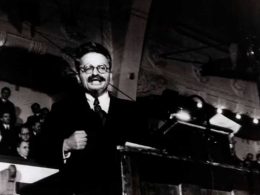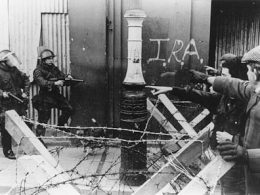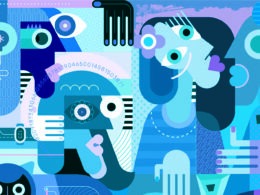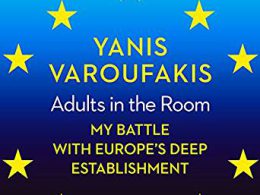By Charlie Jean McKeown
The Red Army lungs thunder out “Soyúz nerushímy respúblik svobódnykh,”1 and immediately the capitalist painting of ‘Communism’ is summoned up, complete with gold stars, bread lines and nukes. Officially adopted in 1944, the State Anthem of the Soviet Union – known by its opening lyrics, “Unbreakable Union” – still roams the world in need of an exorcist. Even today, Putin’s tanks roll under the same melody with lyrics reworked by the original’s co-author, Sergei Milkakov. Beyond Russian borders, the desperation for an alternative to capitalism has renewed interest in the world’s first workers’ state, and its anthem has been an internet meme for the last decade. It now has many remixes and covers on YouTube in a variety of genres, including jazz, techno, and metal.
It has become the music most closely identified with the socialist revolution. Yet, with closer listening and context, ‘Unbreakable Union’ carries counter-revolutionary hallmarks of Stalinism, which would come to undermine such revolution: blinding nationalism, cults of personality, and abandonment of working-class causes across the world.
Abandoning the Revolution
A cornerstone of Stalinist thought was the policy of “socialism-in-one-country,” the determinist notion that capitalism must ‘inevitably’ collapse on its own and that the Soviet Union need only survive for the socialist revolution to succeed.2 Thus, the cause of the international working class was conflated with the strength of the state, protecting what the anthem’s chorus calls:
“The reliable bastion of the people’s friendship!”3
Everything became about fortifying the USSR, even if it meant gutting it of the socialist principles that birthed it. After World War II, Eastern Europe was occupied as a buffer against possible invasion since defence in depth had proved effective against the Wehrmacht.4 Spheres of influence were negotiated with Churchill, carving up the Balkans in the ‘Percentages Agreement.’5 The Comintern – already hollowed out by Stalin of its commitment to international socialism – was disbanded in 1943 to reassure the Western imperialist Allies that they would no longer even give a pretence to promoting working-class revolution abroad.6 In 1944, with the same short-sighted “practicality” that betrayed the Spanish Revolution and brokered deals with Hitler, ‘The Internationale’ – the rallying cry for workers across the world – was replaced by ‘Unbreakable Union’ as the national anthem
Self-defeating Nationalism
The Bolsheviks had inherited a vast “prison-house of nations from the Tsarist Empire.”7 Stalin considered himself an expert on ‘the National Question’ and dreamt up his solution: Through the medium of Russian nationalism, he would create a new ‘soviet nationalism’,8 as the anthem’s first verse expresses:
“An unbreakable union of free republics
Has been eternally welded together by great Russia.”9
It was hardly an innovation but rather a compromise with the old Tsarist policies that maintained Russia as a ‘progressive force’ leading subject-nations to a collective destiny.10 In 1972, Leonid Brezhnev, detached from reality by the bureaucracy Stalin had empowered, proclaimed this new ‘Soviet people’ had arisen across the Union;11 the following 50 years would suggest otherwise. And after Putin inherited this false image of unity under Russia, it was the excuse for his invasions of Ukraine in 2014 and 2022.
Indeed, for all the clear attempts of Putin’s new anthem, ‘Russia, Our Holy Power’, to distance itself from the USSR, it kept the same central ideas of Russian nationalism. For instance, the common concept of a ‘fatherland’ was expressed in the intensely traditional Russian ‘otchizna.’ Other examples include soyuz (union), svoboda/svobodnoye (freedom/free) and narod (people/nation), each characteristically Russian despite intended to represent a union of peoples.12 This was no revolutionary solidarity of nations as called for by ‘The Internationale’; it was the old-fashioned use of nationalism as oppression.
Cult of Personality vs. Workers’ Democracy
At the head of this nationalism were the reverent cults of personality of both Lenin and Stalin. The grotesque deification of Lenin after his death – something he had actively opposed in life – was a vital part of Stalin’s rule over Russia, creating a false lineage to legitimise the latter’s dictatorship. Lenin would have been appalled to hear in the second verse:
“And the great Lenin illuminated our path.
Thus Stalin has raised us, to be loyal to the people,
And he inspired us to labour and do great deeds”13
After Nikita Khruschev’s denunciation of Stalin in 1953, all lyrics were removed from the anthem, but Brezhnev had them reintroduced in 1977; all reference to Stalin remained cut, but the idolisation of Lenin went further now, being used to enhance the Party. Thus, the Stalinist hallmark of bureaucracy was further glorified.
“The Party of Lenin, the strength of the people
Will lead us to communism’s triumph!”14
It is undeniable that Lenin’s role in the October Revolution was vital. However, this portrayal denied the workers’ own leading roles in their own revolution; the expedient story of a “great man leading history” throws away the Marxist call for self-emancipation and the active role of the working class in changing their world. This dictatorship by a domineering bureaucracy coupled with blind faith in a “great leader” can only result in the failure of a socialist revolution.
Nostalgic Delusion
Outside Russia, there are only a few today who still sing ‘Unbreakable Union’ without a hint of irony. However, most are careful not to be confused with Putin’s nationalists and are stained by their devout loyalty to a disastrous regime. Yet when the melody was restored under Putin, the old guard of Russian Stalinists celebrated,15 failing to appreciate that the memory of the USSR was being subsumed for the benefit of a capitalist-imperialist power.
While ‘The Internationale’ remains a potential rallying cry for workers across the world, ‘Unbreakable Union’ is now merely nostalgic self-congratulation and blind nationalism dressed up in leftist language; it played its counter-revolutionary part under Stalin and remains today incompatible with socialist struggle.
Notes
1 Martin J. Daughtry, “Russia’s New Anthem and the Negotiation of National Identity,” Ethnomusicology 47, no. 1 (2003): 47, https://doi.org/10.2307/852511.
2See Leon Trotsky, The Revolution Betrayed for a dissection of the USSR’s decay under Stalin, with the book’s appendix ‘Socialism-in-one-Country’ dealing with this policy specifically.
3 Daughtry, “Russia’s New Anthem and the Negotiation of National Identity,” 47 provides the romanised Russian as Drúzbhy naródov nadyózbny oplót!
4Vladimir Pechatnov, “The Soviet Union and the world, 1944–1953,” in The Cambridge History of the Cold War, ed. M.P. Leffler and O.A. Westad (Cambridge: Cambridge University Press, 2010) 92
5 Mark Mazower, Dark Continent: Europe’s Twentieth Century (London: Penguin Books, 1999), 231 6 Mazower, Dark Continent, 249
7 Ronald J. Hill, “An Unbreakable Union of Free Republics,” Journal of Irish and Scottish Studies 1, no. 2 (2008): 268, https://doi.org/10.57132/jiss.187.
8 Hill, “An Unbreakable Union of Free Republics,” 268-269
9 Daughtry, “Russia’s New Anthem and the Negotiation of National Identity,” 47 provides the romanised Russian as Soyúz nerushímy respúblik svobódnykh / Splotíla navéki velíkaya Rus
10 Hill, “An Unbreakable Union of Free Republics,” 269
11 Hill, “An Unbreakable Union of Free Republics,” 274
12 Daughtry, “Russia’s New Anthem and the Negotiation of National Identity,” 48-52
13 Daughtry, “Russia’s New Anthem and the Negotiation of National Identity,” 47 provides the romanised Russian as I Lénin velíki nam pút ozaríl / Nas vyrastil Stálin – na vérnost naródu / Na trúd i na pódvigi nás vdokhnovíl
14 Daughtry, “Russia’s New Anthem and the Negotiation of National Identity,” 47 provides the romanised Russian as Pátiya Lénina, síla naródnaya / Nas le torzbestvú kommunízma vedyót! 15 Daughtry, “Russia’s New Anthem and the Negotiation of National Identity,” 53












